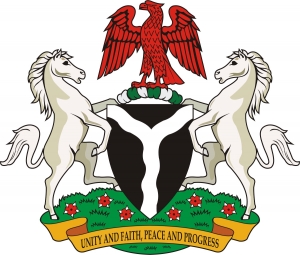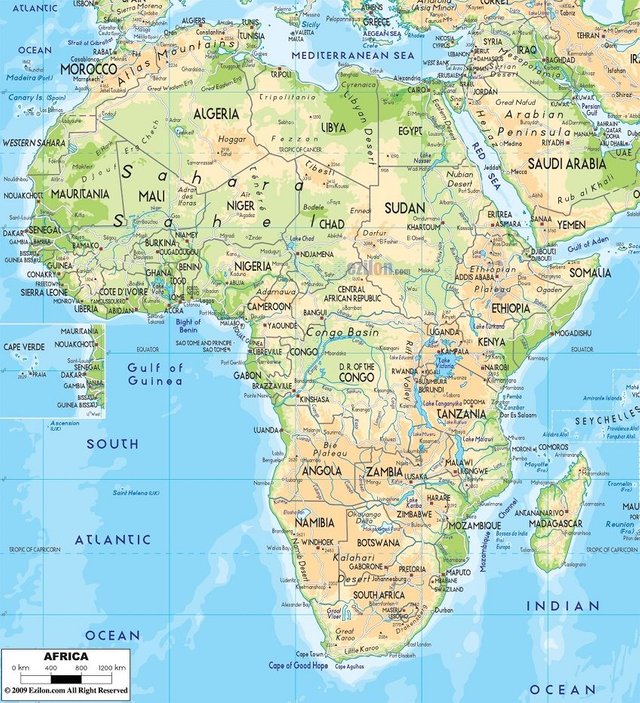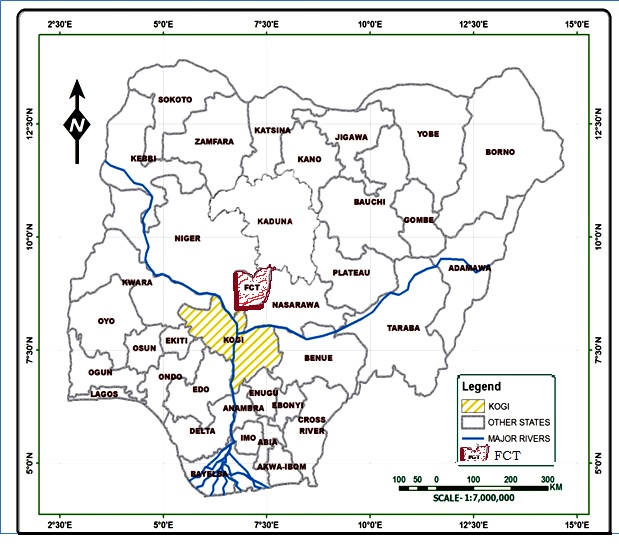AFRICA: THE UNTOLD STORY - EPISODE #2
NIGERIA
 Nigeria Coat of Arm
Nigeria Coat of ArmSource:here
Location, Population, Physical Geography

Sourcehere
Nigeria is the most populous black nation in the world. Located at the trigger of Africa, making it one of the most important of Black Countries of the World.
Nigeria is located within the degrees of Latitude 4N - 14N of the Equator and Longitude 3E - 15E of the Greenwich Meridian. The country has a landmass of 923,768km2 with a population of over 180million. Bounded by Cameroun in the East, Chad Republic in the North East, Niger Republic in the North, Benin Republic in the West and Atlantic ocean in the south. The country has a coastline of about 853km. In landmass, it is four (4) times the size of Britain and in population, twice the size of Britain that colonized the country.
 map of Nigeria
map of NigeriaWeather and Climate
Nigeria enjoys a tropical climate with two seasons the rainy and dry seasons. The rainy season spans April to September while the dry season spans October to March. Although, it varies from one location to another as there are places that enjoy all year round rainfall whereas some 6 months rainfall, thus making it possible for diversity of weather in the country.
The country is blessed with good agricultural land for farming and as such any of the food consumed can be produced within the country. However, some of the food crops based on their climatic requirements are regionalized which is good as the northern and southern regions compliment each other in scarcity and surplus of food supply.
HISTORY
The country name Nigeria was coined from the major river in the country which is River Niger. From the word Niger area, we have Nigeria christened by Flora Shaw the wife of the first Governor General (Federick Lord Lugard) under the colonial rule. The present day Nigeria was in the past existing as different protectorates which were amalgamated under the British colonial rule for ease of administration.
 Frederick Lord Lugard's
Frederick Lord Lugard's People, Ethnic Groups and Languages
Nigeria is made of different tribes which ranges from Hausa, Yoruba, Igbo as the major ones. In fact, the country is made up of over 250 languages and over 500 ethnic groups making it one of the most diverse countries of the world. Other major languages are Fulani, Kanuri, Ibibio, Tiv, Efik, Edo, Ijaw, Nupe, Isetkiri, Ebira, Igala among others.
There are many more over 400 native languages, some are now threatened by extinction as a result of modern official language of English and Pidgin English which have now been adopted widely as a social language.
The Northern people are majorly Hausas and Fulanis, while the Yorubas are in West, Igbo in the East, and many others in South.

Nigeria National Flag
Nigerian is a home for everyone, red, yellow, black and white without discrimination because of their love for strangers and visitors. Visitors are always well entertained. Today Nigeria is made of different ethnic groups in so much that many who are not aboriginals have become a citizen. Having many individuals from the surrounding countries like Benin, Niger, Cameroun, Chad, Ghana, Mali among other African countries. These people are cohabiting peacefully and have become indigenes over time.
Socialization
Nigerians are loving, peaceful and happy people. No wonder, they were tagged the most happy nation in the world following their endurance of hardship and political instability. They value their lives, love themselves and accord respect one to another.
Premium is placed on respect. In fact, not greeting a Nigerian, especially an elderly person can be seen as an act of disrespect. Each of the tribes has a customary way of greetings both for male and female. Hausa man stool to greet, a Yoruba prostrate or kneel before an elder, an Igbo person can have a hand shake with an elder, also for a Deltan among others. In general, greeting is highly valued and is commonly shared even with a stranger. Greeting is not limited to your immediate environment; therefore, it is expected of you even while outside your environment from people who you dont really know.
Also, objects are passed with the right hand or both hands. It is offensive to pass an object with left hand.
Industrialization
The country developed over time from cottage to modern industrial system. However, there still exist some of the cottage industries among these are:
Black Smithing, Pottery, Weaving & Clothing, Food processing industries.
Before the discovery of oil in the 70s, agriculture was the main stay of the economy which employed over 85% of the total population. Oil discovery shifted attention from agriculture, with many looking for white and blue collar jobs. The discovery of oil brought about boom in the economy which ushered in greediness and corruption. The money was much, but was in the hands of few individuals who can assess it through political power as politics turned the base of the super structure (economy).
Before oil discovery, money flow from the regions to the center (i.e. from individuals who are farmers to the capital). Food crops like yam, cassava, maize, sorghum, millet, etc and cash crops like cocoa, coffee, rubber, cashew, cotton, are majorly grown. Some of these crops are regionalized, in the 80s there exist groundnuts pyramid in the northern Nigeria, Cocoa, Oil Palm, Cashew, Coffee in West; Oil Palm, Rubber, cotton in the East among others, however, they still exist in trace quantities. Agriculture ushered in prosperity and as such many capital projects were established. Agriculture facilitated road construction as well as the rail line to the length it is today.
Also establishment of industries like the largest African Iron and Steel company, the West African Ceramic Company, Pan African Ltd among others were facilitated through agricultural proceeds. Today, these industries are underperforming because it has received little or no attention from the government and as such many graduates are left unemployed.
Today, about 50% of the population still involve in agriculture even some of those doing white collar jobs so as to enhance food production in the country.
Political System
Following the countrys independence from the colonial rule in 1960, the country gained self-governance in 1963 after which an election was conducted. The progress the country would have attained was hampered by incessant military rule for which many of the heroes that aided the independence lost their lives.
Efforts to bring about democracy failed until 1999 when Major General Abdulsalam Abubakar relinquished power to democratically elected president (Former Military ruler Gen. Olusegun Obasanjo). This marked the beginning of democracy in Nigeria political system as well as the scrambles for power by individuals not for the purpose of national interest but to satisfy their own predicament with nepotism becoming the order of the day.
Today, Nigeria is made up of 36 states and the Federal Capital Territory (FCT), Abuja and with 774 Local governments with 6 at the FCT.
Education
Before advent of western education, there were local settings for teaching people arts, crafts, trades, languages among others. The western education started in the south-western part of the country which had a firsthand contact with missionary. When western education would have proliferated to the Northern, it was successfully restricted because of certain religious belief that western education is a sin.
The Southerners and Westerners embraced education but continued to be ruled by the Northerners that have little education. Although some of them who were brought up outside the country enjoyed education.
Today, Nigeria is one of the most educated countries in the world with a literacy level of over 60%. At first, it was believed that education is the key to access the national cake, as incentives were made available for individuals who managed to obtain a degree. In the 70s, on graduation people of this time enjoyed automatic job, house and a car. Following this trend, many desires education by all means as people who were educated were offered an enhanced life.
Competition arose, schooling became herculean leading to the survival of the fittest, and this called for establishment of many schools at different levels.
Today, there are over 120 universities in Nigeria (both public and private), with several numbers of Polytechnics, Monotechnics and Colleges of Education, making education available to the people. In Nigeria, 3 or more of 5 individuals sampled will have a degree. Categorically Nigerians can be said to be the most learned of the black population of the world.
Urbanization
The country have developed over time with cities and towns known today to be world class among these we have Lagos, Kano, Port-Harcourt, Jos, Kaduna just to mention a few. Importantly is Abuja which is the Federal Capital Territory, the only city designed on paper first before development. Following the design of the city, the Federal capital was moved from Lagos to Abuja.
Essentially, owing to the existence of different tribes, ethnic groups, languages among others; it was desired that Nigeria have a Federal Capital Territory that will be centrally located where none of the major ethnic groups would be the majority, this led to the design of Abuja city.
 Nigeria Coat of Arm
Nigeria Coat of ArmSource:here
Investment Opportunities
Nigeria is large a market for goods and services. Because of the reasonable population endowment, Nigeria is the biggest market for products and services in Africa consuming both locally and internationally produced goods. Looking for a good location to invest in Africa, Nigeria is one of the places to consider. Vast land for industries, low tariff on goods produced, friendly government especially with foreigners, large labour, cheap labour, skilled labour among others are available in large supplies in Nigeria.
Nigerians are no doubt industrious, for some that cannot find a suitable job at home, they are abroad doing great.
NIGERIA IS A PLACE TO BE.
Other episodes to be made available on these tags @africa @wafrica and the country under discussion. Visit @sapient1 for episode #1
To be continued in the next episode
PLS UPVOTE AND RESTEEM
A handful of facts about Nigeria here. Great efforts buddy.
Thanks boss. Watch out for the next episode